LISLE, Ill. — Navistar Inc., working in collaboration with General Motors and hydrogen fuel company OneH2, plan to produce a fuel-cell-electric International RH Series truck, which they hope to have available for purchase by model-year 2024.
“Hydrogen fuel cells offer great promise for heavy duty trucks in applications requiring a higher density of energy, fast refueling and additional range,” said Persio Lisboa, president and CEO of Navistar. “We are excited to provide customers with added flexibility through a new hydrogen truck ecosystem that combines our vehicles with the hydrogen-fuel-cell technology of General Motors and the modular, mobile and scalable hydrogen production and fueling capabilities of OneH2.”
The vehicle’s testing phase is expected to begin by the end of 2022. J.B. Hunt Transport Inc. will pilot the initial testing of the zero-emission long-haul system. The integrated solution will be competitive with other powertrain offerings with a target range of 500+ miles and a hydrogen fueling time of less than 15 minutes.
“J.B. Hunt is committed to delivering more while using less, and this new fully-integrated solution offers a prime opportunity to do that,” said John Roberts, president and CEO of J.B. Hunt. “We are excited for the potential of this innovative business model and look forward to sharing our learnings from this pilot program with Navistar and its involved technical and infrastructure partners.”
The International RH Series FCEV will be powered by two GM Hydrotec fuel cell power cubes. Each Hydrotec power cube contains 300-plus hydrogen fuel cells, along with thermal and power management systems. The combined propulsion system in the International RH Series FCEV will feature better power density for short-range travel, better short-burst kW output and a per-mile cost expected to be comparable to diesel in certain market segments.
“GM’s vision of a world with zero emissions isn’t limited to passenger vehicles. We believe in EVs for everyone,” said Doug Parks, GM executive vice president of global product development, purchasing and supply chain for GM. “We’re thrilled to work with like-minded companies like Navistar and OneH2 to offer a complete solution for progressive carriers that want to eliminate tailpipe emissions with a power solution that can compete with diesel.”
Under its partnership agreement with Navistar, OneH2 will supply its hydrogen fueling solution, which includes hydrogen production, storage, delivery and safety. In addition, Navistar will take a minority stake in OneH2. Through its affiliates, OneH2 plans to kick-start substantial hydrogen heavy truck refueling infrastructure by incorporating more than 2,000 International RH Series FCEVs into existing truck fleets in the near term.
“We’re excited about the opportunity to partner with Navistar,” said Paul Dawson, president and CEO of OneH2. “We believe strongly that hydrogen fuel is the future of zero-emission renewable energy in the heavy truck market, and are pleased that this agreement will provide additional scope for its application. Under this agreement, we will be able to offer fleets a zero-emission truck with total cost of operation lower than diesel in key segments of the industry.”
These newly announced collaborations with General Motors and OneH2 represent important milestones in Navistar’s phased development of hydrogen fuel cell solutions. These technologies leverage Navistar’s battery electric vehicle platforms and provide the customer with a single-source, fully integrated zero-emission solution that includes vehicles, fueling and service.
The Trucker News Staff produces engaging content for not only TheTrucker.com, but also The Trucker Newspaper, which has been serving the trucking industry for more than 30 years. With a focus on drivers, the Trucker News Staff aims to provide relevant, objective content pertaining to the trucking segment of the transportation industry. The Trucker News Staff is based in Little Rock, Arkansas.















Wait just a second here. First the low sulfur fuel, then, the DEF. I thought we already had zero emission trucks. I know I was in a meeting and heard the air coming out of the exhaust was cleaner than the air going into the intake. I am not saying you should breathe that exhaust, but, bet you shouldn’t inhale the hydrogen cell exhaust either. Sounds like a money grab to me. What are these Las Vegas odds that California will have additional emission standards for hydrogen fuel cells? Perhaps some version of catalytic converter? I’m starting to think being “WOKE” to the con, goes beyond politics and the stock market. Enlighten me?